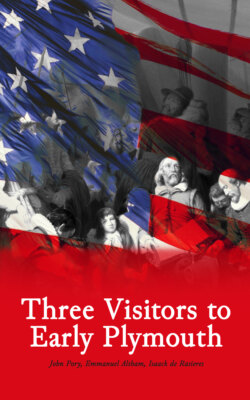Читать книгу Three Visitors to Early Plymouth - John Pory - Страница 8
На сайте Литреса книга снята с продажи.
ОглавлениеEMMANUEL ALTHAM
Table of Contents
Emmanuel Altham (1600-1635/1636)
Table of Contents
Emmanuel Altham was born a gentleman, though his family had its connections with commerce and the legal profession rather than the titled aristocracy. His two older brothers successively held the family’s country seat at Mark Hall, Latton, about twenty miles north of London. As a younger son, Altham inherited little of his parents’ wealth and so, over objections by his relatives, sought excitement and his fortune in the expanding world of English overseas trade. Altham began as an investor in the Company of Adventurers for New Plymouth, served for a time as agent of the Company, and became an admirer of the colonists and New England with such ardor that he could more easily envision the colony’s future success than see the hardships which the planters were enduring when he first arrived. He went to the New World with a sense of honor, moreover, rather than the qualities of a hard-driving trader. Perhaps he was not a typical Adventurer: his devotion to the cause of colonization and taste for the heroic side of commerce rather than the ledger went beyond the ordinary, and helped keep English backing for the Pilgrim plantation alive when profit did not.
Altham crossed the Atlantic to Plymouth the first time in the summer of 1623. He went as “Captain” of the Little James (James Bridge, master), the pinnace of about 44 tons which the Company was sending to the plantation for use in fishing and fur-trading expeditions. In 1623, the expert in charge of sailing a ship was her “master,” and if there was a captain, he had command over the military and mercantile affairs of the voyage. Since his ship carried authorization to operate as a privateer, Altham had the decision about taking prizes as well as the transaction of business. After a year in New England waters, described in the first three of Altham’s letters printed here, he recrossed the ocean with the ship. She was seized for the satisfaction of debts to two of the Company’s members, Thomas Fletcher and Thomas Goffe, who sent her (but not under Altham) on a second voyage in 1625.
Altham’s fourth letter from New England describes the occasion of his second expedition, on his own. Evidently his hopes for a future with the colony faded, for he returned to England some time before July 1626 and soon afterwards began to look for employment as a soldier with the East India Company.
Through the influence of his brother, Sir Edward, he was sent to the Company’s fort at Surat and spent over two years in exploits around the Indian Ocean. The East India Company’s business was a mixture of trade and raid—competing with the Portuguese for control of port cities in India and the trade to which they gave access. The climax of these years, for Altham, was an expedition to Madagascar and Mozambique to intercept the fleet of caracks from Portugal.
After a visit to England in 1630, Altham returned to India a more important man: Factor and Captain of the fort at Armagon (now abandoned, at a place about sixty miles north of Madras), the Company’s main post on the east side of India. He served the firm well, rebuilt the fortifications, and finally began to accumulate wealth. He expected to return to England permanently and live in style—had even begun to order paintings and fancy bedding, but died at Armagon in January, 1635/1636.
The originals of the letters of Emmanuel Altham to Sir Edward Altham belonged to Dr. Otto Fisher, of Detroit, who before his death generously consented to their first publication here. The letter of Altham to James Sherley has been published in Massachusetts Historical Society, Proceedings, XLIV, 182-189, from a transcript of the original in the English Public Records Office (Admiralty Court Misc., bundle 1142), with editorial comment and notes by J. F. Jameson.
